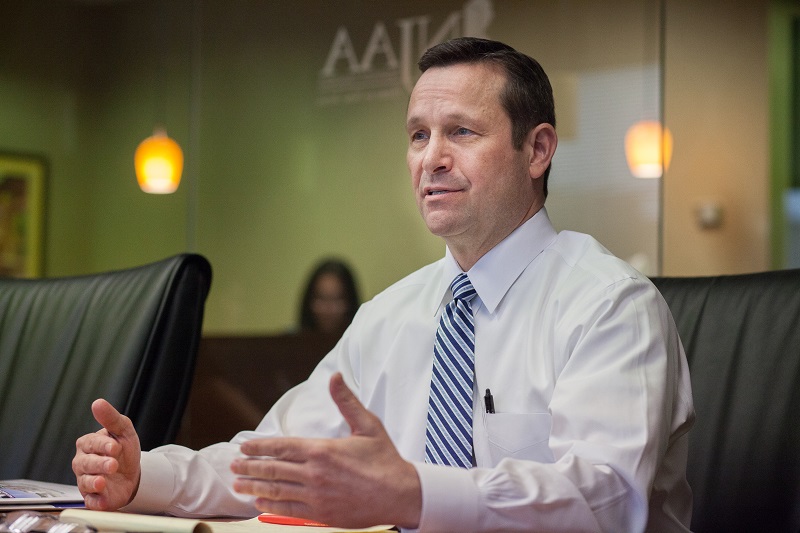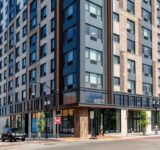David Brogan, executive director of the New Jersey Apartment Association, speaks at the organization’s headquarters in Monroe. — Photo by Mary Iuvone for Real Estate NJ
By Real Estate NJ
With millions of New Jersey residents ordered to stay at home, apartment owners and managers are set to play a critical role in the effort to curb the spread of COVID-19.
They’re also bracing for a major impact from a teetering economy and the prospect of some residents being unable to pay rent, which will weigh heavily on apartment owners’ ability to pay their own employees, mortgages and property taxes. Not to mention the need to respond to tenant emergencies and disruptions to the supply chain, which have impacted everything from cleaning supplies to appliances.
Real Estate NJ reached out to David Brogan, executive director of the New Jersey Apartment Association, to discuss how the industry is grappling with the coronavirus crisis, the government response and the realities of social distancing. The association represents more than 210,000 apartment homes in New Jersey and has more than 400 vendor members comprising roughly 135 industries throughout the state and nationally.
RENJ: How has the stay-at-home executive order affected your industry?
David Brogan: Clearly, what we are experiencing is unprecedented. Given that our industry houses over one million New Jerseyans, and the public is being told to stay at home, the apartment industry plays a critical role during this crisis. While the language in Executive Order 107 seems to allow for our operations to continue, we are continuing to ask for a specific designation of multifamily as an “Essential Business.” Simply put, we must be able to continue to provide housing, and we must be able to maintain that housing and provide services to our tenants. We also have to be able to respond to emergencies. If we can’t, what you will see is an exacerbation of the spread of the virus, and from a day-to-day living perspective, the inability to respond to repairs, maintenance requests and other tenant issues.
As you might imagine, if you are a tenant with an overflowing toilet, you need someone to fix it. Professionally managed properties take tenant issues seriously. Furthermore, depending on the types of buildings in each apartment complex, in some cases necessary packages get delivered to the leasing office for our tenants. This could include medication or other necessities. Clearly, we need to be there to accept those packages. We also need to provide housing to those who are seeking it. Whether it involves people who are currently homeless or those who are currently moving, such people need to be able to find housing. We want to work with our current tenants, prospective tenants and the government in order to provide the housing and services New Jerseyans need during this difficult time.
Since we are in uncharted waters, I can only imagine the number of requests the Governor and his staff are receiving. One thing I would add as a necessary step is some sort of rental assistance program. Our members are working with our tenants during these difficult times. However, the state and municipalities are expecting their tax payments, vendors are expecting to get paid for work done or for goods delivered, we need to continue to pay our employees and mortgages need to be paid. We cannot do that without rent revenue or some sort of assistance. As such, we would ask for the Governor to consider an emergency rental assistance program that could go into effect immediately.
The Governor and the Legislature must also recognize that as an industry we employ over 50,000 people and our employees are impacted just as those in any other industry. Furthermore, we are an industry that provides housing, which is a critical necessity. It takes staff to operate and maintain those buildings and it also takes staff to continue to be responsive to our tenants. Our members have very good and sometimes decades-long relationships with their tenants. As such, as measures are considered to counter the negative economic aspects of this crisis, I would ask that the apartment industry be considered in those measures.
While I make these requests, I do want to give the Governor and his staff credit for the job they have done thus far. The Legislature has also been working around the clock in an effort to be responsive to the concerns of all New Jerseyans. We are dealing with an unprecedented crisis and we understand that the Administration and the Legislature have many demands being placed on them. I hope that the Governor and the Legislature both view our industry as a partner in this crisis. We are here to help as much as we can.
RENJ: What can property owners and managers do — or what are they already doing — to deal with large quantities of residents being home during the day?
DB: With more people staying home, this places significant added pressure on heating, air conditioning and plumbing systems. That means more maintenance calls as things start to break down. Furthermore, with a shortage of basic necessities such as toilet paper, people are flushing other things down the toilet and causing blockages and other problems. As such, a basic necessity problem leads to a plumbing and sanitation problem, which could lead to water damage and other issues. Given this potential domino effect, our members are working to educate residents on the impacts such actions can have.
In terms of other steps our members are taking, even prior to the Executive Order, many of our members closed fitness centers and clubhouses to limit gatherings of people. Many properties did enhanced cleaning and sterilizing, they added hand sanitizer dispensers in common areas where feasible and available, and established social distancing policies. Clearly, after the EO, these steps were enhanced.
RENJ: What types of extra costs are associated with those steps — and anything else related to COVID-19 — and what recourse do property owners have for bearing those costs?
DB: Price increases or price gouging impacts the apartment industry just as it impacts other industries. When a person attempts to get a $2 bottle of sanitizer and has to pay $12, the impact to our industry is exponentially higher. The same holds true for cleaning products. We have also experienced supply chain issues with appliances. If a tenant’s refrigerator breaks down, we need to be able to get them a new one as soon as possible. We have seen some significant delays.
As for recourse, I am not sure. We have to buy cleaning products to clean our buildings. We need to buy toilets and appliances. We need to buy plumbing supplies. Our members are experiencing significant price increases that will ultimately hurt their business. What I would ask people to consider is that an apartment building is like a living, breathing entity. It needs constant care and maintenance. Any product price increase that impacts our ability to operate, repair and maintain those buildings will negatively impact our industry.
RENJ: How much of an impact do you expect from the moratorium on evictions?
DB: First, I will say that our members are working with our tenants, with or without an Executive Order. We understand that we are all in this together. Having said that, the owners of those properties still have obligations. As stated earlier, that includes paying staff, paying mortgages, paying vendors, paying taxes, etc. We have not heard of any reprieve on paying things like property taxes, and given that our business relies on rents, we need either rent revenue from tenants or we need some sort of government assistance.
Beyond a state rental assistance program, which is the most critical for our industry, if the federal government does not provide mortgage assistance of some sort, we are asking that the Governor and Legislature consider some form of forbearance order or legislation that directs the banks to be flexible with those who hold residential or commercial mortgages. A lot of attention is focused on individuals, and rightfully so. However, if rents are not coming in, our industry needs flexibility from the banks as well. New York just issued an Executive Order to that effect providing 90 days of relief. We would ask New Jersey to follow suit.
The Governor has publicly asked our industry to do what we can during this difficult time, and I promise you, we are. However, we do need rents or government assistance; otherwise we will fail to pay the obligations we have as a business. Furthermore, without that assistance, some of our members could go out of business. In a time of national crisis, you absolutely don’t want apartment communities to go into foreclosure. That helps no one. People lose their businesses, employees lose their jobs, tenants can lose their homes and then it simply adds more problems to the crisis we are currently facing. In short, we will need some kind of help.
RENJ: If there was anything you would ask of the Governor, what would it be?
DB: First, I would reiterate that the Administration is doing a very good job under extraordinary circumstances. In his press conferences, the Governor has been informative and has also used language that I believe, has helped ease some of the stress we are all facing, and I would thank him for that.
I would reiterate that apartment communities are an essential business and would ask for language or guidance to that effect. I would ask him to consider a rental assistance program because just as tenants and other business need assistance, so do we. Again, the last thing you want is a diminution of services, an impact to business operations that negatively affects employees, or in a worst-case scenario, an apartment owner going out of business.
One other item I would mention is that there are also people looking for housing. This crisis shouldn’t prevent someone from getting housing and we need to be able to provide that housing under these circumstances.
Lastly, as this crisis unfolds, I would simply say to the Governor and the Legislature, we are here to work with you. If we can assist in any way, we will. And we understand the role we currently play during this crisis, especially with the stay at home Executive Order. Our properties are critical to the daily lives of over a million New Jerseyans, they need to function safely to sustain daily life, and we take that responsibility very seriously.










